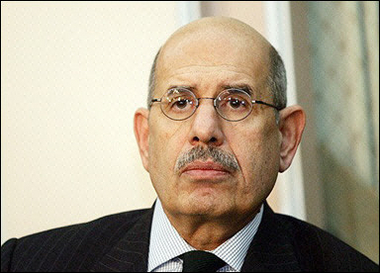Iran has failed to comply with a UN deadline to halt uranium enrichment, UN
Nuclear Chief Mohamed ElBaradei said in a crunch report on Friday that opens the
door to possible international sanctions.

International Atomic
Energy Agency (IAEA) head Mohamed ElBaradei speaks to journalists upon his
arrival to the Tehran's Mehrabad airport, on April 13. Iran has failed to
comply with a UN deadline to halt uranium enrichment, UN nuclear chief
Mohamed ElBaradei said in a report Friday that opens the door to possible
international sanctions. [AFP\file] |
The report said the International Atomic Energy Agency (IAEA) had taken
samples on April 13 at Iran's enrichment facility in Natanz "which tends to
confirm as of that date the enrichment level (of 3.6 percent) declared by Iran".
It said that during March, Iran completed a 164-machine cascade, referring to
centrifuges arranged in series in order to enrich uranium, and that another two
similar cascades were under construction at Natanz. The confidential report,
obtained by the AFP, was also circulated to the UN Security Council members in
New York.
In a first reaction, US President George W. Bush said he wanted to resolve
the dispute "diplomatically and peacefully," while British Foreign Secretary
Jack Straw said London would ask the Security Council to raise the pressure on
Iran.
The world body had set Iran a non-binding, 30-day deadline - running out
Friday - to comply with the demands to halt enrichment, which makes the fuel for
civilian nuclear reactors, but which can also be the explosive core of atom
bombs.
But Iran has strongly rejected suspending enrichment, hard-line President
Mahmoud Ahmadinejad vowing on Thursday that his nation "will not bow to
injustice and pressure".
ElBaradei's report clears the way to a new phase of diplomacy, with the
United States now ready to seek a Security Council resolution legally obliging
Iran to meet IAEA demands.
If Iran still refuses, such a resolution could lead to punishing economic
sanctions and even military action, although Tehran's allies and major trading
partners Russia and China oppose any such move.
ElBaradei also said in his report that Iran has failed to fully cooperate
with the UN inspectors trying to determine if Tehran's nuclear programme is
peaceful or weapons-related. This request was made in the Council's presidential
statement of March 29.
The report said there had been little progress since a previous assessment
and "gaps remain in the agency's knowledge with respect to the scope and content
of Iran's centrifuge programme".
The report said Iran had failed to provide "transparency measures" allowing
for wider inspections. It also brought up a new item, namely that the IAEA is
unable to rule out that Iran may have received plutonium, which is an atomic
weapons material, from abroad.
"The agency cannot exclude the possibility, notwithstanding the explanations
provided by Iran, that the plutonium analysed by the agency was derived from
sources other than the ones declared by Iran," namely domestic experiments, it
added.
Iran has offered to provide a timetable for co-operation with the UN nuclear
inspectors if the IAEA, rather than the Security Council, oversees Iranian
compliance, the report said, citing an 11th hour letter sent by Iran on
Thursday, the day before the deadline fell.
"Iran will provide a timetable within the next three weeks" if "the Iran
nuclear dossier will remain, in full, in the framework of the IAEA and under its
safeguards," the IAEA said. Diplomats described this as the kind of stalling
tactic Iran has used in the past. "Let's sleep another night on this letter and
see what the Iranians say after they read the report," a senior official close
to the IAEA said.